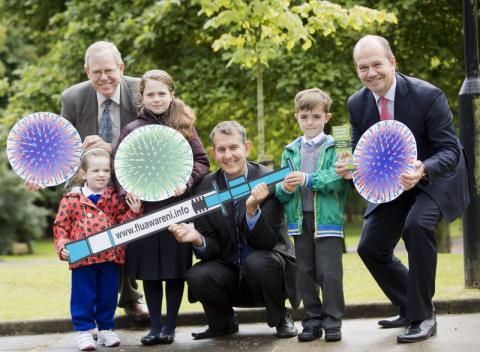Major childhood flu vaccination programme

The Public Health Agency (PHA) is today launching phase two of its childhood flu vaccination programme which will see immunisation being offered to pre-school children aged two years and over, and all primary school children. This will help protect against the disease and reduce spread.
Today’s launch comes after children in primary six and two and three year olds were offered the vaccine last year as part of phase one.
Dr Richard Smithson, Consultant in Health Protection at the PHA, said: “Never before has a routine vaccination programme endeavoured to annually vaccinate so many children within such a short space of time.
“Last year the vaccine was offered to primary six children and over 80% of them were vaccinated, by far the highest uptake in the UK. This was an excellent achievement, demonstrating the skill and dedication of school nursing teams and the commitment of parents to ensuring their children are better protected against this unpleasant and potentially serious infection.
“If we can achieve a similar uptake this year with all primary school children being offered the vaccine, then this should have a significant impact on the amount of flu that we see. We also hope that once again parents of pre-schoolers over two get them vaccinated at their GP’s surgery.
“The flu virus spreads easily and quickly, infecting both adults and children alike. This can lead to days spent in bed rather than being at school or nursery, with parents having to stay at home to take care of sick children and any siblings who catch it. This can cause considerable inconvenience for the whole family, made all the more difficult if one or both of the parents catches flu as well.
“Flu can cause the same unpleasant symptoms in children as it does with adults – fever, chills, aching muscles and joints, headache and extreme tiredness. These symptoms can last between two and seven days and for some can lead to serious illness and result in a stay in hospital.
“The flu virus spreads through the air when people cough and sneeze without covering their nose and mouth, and because young children don’t always cover their noses or mouths when coughing or sneezing, the virus can spread very quickly among them.”
Childhood flu vaccine
Dr Smithson continued: “During autumn 2014 we will introduce the second phase of this vaccination campaign. All pre-school children aged two years and over on 1 September 2014 and those in primaries one to seven will be offered the flu vaccine as part of the seasonal flu programme. Nearly all children will receive the vaccine via a quick and painless nasal spray. The nasal vaccine has been shown to provide even greater protection for children than the flu injection. There are a few children who cannot receive the nasal spray and they will be offered the injection instead.
“We encourage parents and guardians of all children in these groups to get their child vaccinated, as children who have the vaccine will be better protected against the flu virus and it will reduce the risk of passing the disease on to other children or family members, some of whom may be at increased risk of being seriously ill from having the flu.”
Primary school children will receive the vaccination at school and pre-school children aged two years and over will receive the vaccination through their local GP surgery.
All at-risk children should continue to receive the flu vaccine as they have done in previous years. Parents of pre-school children can check with their GP practice on arrangements for getting the vaccine. Parents of primary school children should look out for letters and consent forms over the next couple of months as children should be bringing them home in their school bags. It is important that consent forms are completed, signed and returned so that your child can be protected with the vaccine.
Health Minister Edwin Poots said: “I introduced the childhood flu vaccination programme in 2013 in line with a recommendation from the Joint Committee on Vaccination and Immunisation (JCVI), to all two and three year olds and all children in primary year 6. I am pleased to note that Northern Ireland achieved the highest uptake rates across the UK and I would again urge all parents and guardians of eligible children to take up the offer of this free flu vaccination and help give their children the best protection against influenza.”
The extended flu vaccination programme is being phased in over several years to enable arrangements to be established for full implementation and will eventually cover all children aged between two and 16 years.
For more information about the flu vaccine for 2014/15, visit www.fluawareni.info, or speak to your GP/nurse or member of staff within the school nurse team at your local Health and Social Care Trust.
Ends
